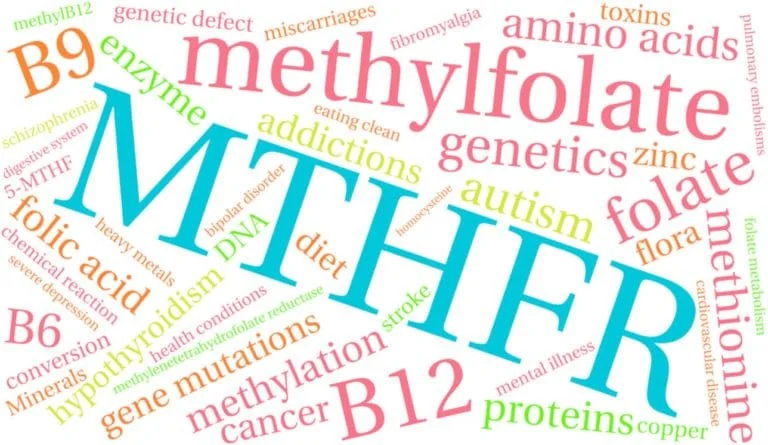Cerebral
Folate Deficiency
L-methylfolate
folinic acid (Leucovorin)
Autism Spectrum Disorder
& more
Understanding Methylation, MTHFR, and Folate Pathways in Autism and Related Disorders
The Role of Methylation in Brain Function
Methylation is one of the body’s most essential biochemical processes, influencing DNA expression, neurotransmitter production, detoxification, and cellular energy regulation. When methylation is disrupted, these fundamental systems can be affected—impacting development, cognition, and emotional regulation.
In neurodevelopmental conditions such as autism spectrum disorder (ASD), research has shown that imbalances in methylation and folate metabolism can contribute to core and associated symptoms. These pathways intersect with mitochondrial function, oxidative stress, and immune activation—systems often found to be dysregulated in autism and related conditions.
MTHFR and Folate Transport Systems
The MTHFR gene (methylenetetrahydrofolate reductase) plays a key role in the conversion of dietary folate into its biologically active form, L-methylfolate (5-MTHF). Methylfolate fuels methylation reactions throughout the body, including those that synthesize neurotransmitters such as serotonin, dopamine, and norepinephrine.
Polymorphisms in MTHFR (most commonly C677T and A1298C) can reduce this enzyme’s efficiency, leading to lower methylfolate levels and impaired methylation. However, how folate enters the brain is equally important—because this process depends on several specialized transport mechanisms.
Key Folate Transporters:
Folate Receptor Alpha (FRA) – The primary system that transports folate across the choroid plexus into cerebrospinal fluid (CSF).
Reduced Folate Carrier (RFC) – A secondary transport route that can move both methylfolate and folinic acidinto the CSF when the FRA pathway is compromised.
Proton-Coupled Folate Transporter (PCFT) – A system used particularly by methylfolate, which can also cross the blood–brain barrier through diffusion—something folinic acid cannot do.
Cerebral Folate Deficiency and Autoimmune Mechanisms
In some individuals, the immune system produces antibodies that block Folate Receptor Alpha (FRA). This prevents folate from entering the brain efficiently, resulting in Cerebral Folate Deficiency (CFD). Symptoms can include developmental regression, irritability, sleep disturbance, seizures, motor abnormalities, and autistic features.
In these cases, methylfolate and folinic acid are used to bypass the FRA blockade via alternative transport routes. Methylfolate can utilize both RFC and PCFT, while folinic acid depends solely on RFC. Because the RFC pathway is less efficient, higher doses of folinic and methylfolate are often required to achieve therapeutic levels in the CSF. This explains why certain clinical studies, such as those led by Dr. Richard Frye and colleagues, used relatively high doses of folinic acid.
However, prolonged high dosing can sometimes lead to irritability or behavioral activation. As a result, many clinicians have found that combining methylfolate and folinic acid in moderate, sustainable doses offers the best clinical outcomes—leveraging the strengths of both compounds while minimizing side effects.
Functional Roles: Folinic vs. Methylfolate
Although both folinic acid and methylfolate are forms of active folate, they serve distinct biological purposes:
Folinic acid (leucovorin) primarily supports the synthesis of DNA, RNA, histones, GTP, nitric oxide (NO), and tetrahydrobiopterin (BH4)—key molecules in cellular growth and neurotransmitter production.
Methylfolate, on the other hand, drives methionine synthesis and regulates the body’s primary methylation cycle, influencing gene expression, neurotransmitter balance, and detoxification.
Importantly, the CSF testing in the Frye studies measured methylfolate—not folinic acid—suggesting that optimal brain folate status depends significantly on methylfolate availability, especially in the presence of FRA-blocking antibodies.
A Combined and Individualized Approach
Emerging literature supports a dual approach that combines both methylfolate and folinic acid to optimize folate transport and methylation efficiency. This method supports multiple transport systems (FRA, RFC, PCFT) while providing both biochemical substrates needed for DNA synthesis and methylation.
For some individuals, especially children with autism or CFD, this combination can rapidly restore folate status in the central nervous system and may be used long-term as part of an integrative treatment plan. The specific ratios and doses should always be individualized based on genetics, tolerance, and clinical response.
Beyond Autism: Other Conditions Involving MTHFR and Methylation
Methylation and folate metabolism influence a wide range of physiological and psychiatric processes beyond autism. MTHFR variants and methylation dysfunction have been implicated in:
Depression and anxiety
Bipolar disorder
Schizophrenia
Chronic fatigue and fibromyalgia
Recurrent pregnancy loss and infertility
Cardiovascular and cerebrovascular disease
Neurodegenerative disorders such as Alzheimer’s disease
Supporting methylation through targeted nutrition and appropriate forms of folate can improve neurotransmitter synthesis, reduce oxidative stress, and enhance overall neurological stability.
In Summary
Methylation and folate transport are deeply interconnected processes that influence nearly every aspect of brain and body health. In autism and other neuropsychiatric conditions, identifying and addressing MTHFR polymorphisms, autoimmune folate receptor blockade, and related metabolic imbalances can lead to meaningful improvements in cognition, behavior, and emotional well-being.
Modern research supports a nuanced, combined approach to folate therapy—one that recognizes the unique and complementary roles of methylfolate and folinic acid in restoring optimal folate function across cellular and neurological pathways.
At Open Road Psych, our clinical philosophy embraces this complexity. By integrating genetics, neurochemistry, and personalized treatment planning, we aim to support each patient’s unique biochemical balance and promote sustained mental wellness.
